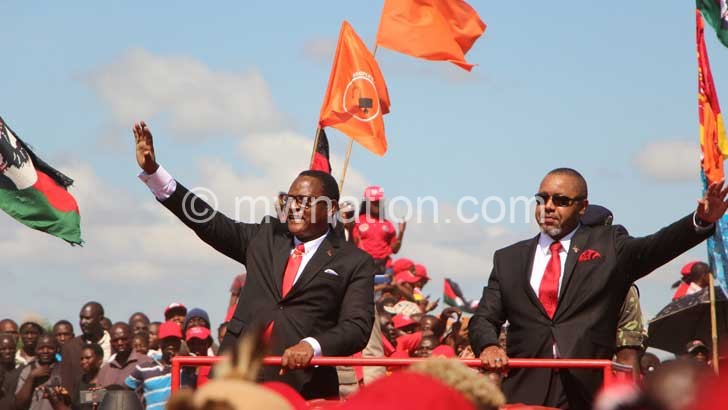Campaign pledges Under spotlight
Following Minister of Finance Felix Mlusu’s presentation of the full 2020/21 National Budget on Friday, the nine-political party Tonse Alliance’s campaign promises have come under the spotlight with some critics noting some omissions.
In the run-up to the court-ordered June 23 Fresh Presidential Election following the nullification of the May 21 2019 presidential election over irregularities, President Lazarus Chakwera’s administration has been under the spotlight on delivery of key campaign promises.
While the President is yet to clock the first 100 days of his five-year term of office, several commentators, including the former governing Democratic Progressive Party (DPP) have faulted the new administration for purportedly omitting key campaign pledges that promised Malawians Canaan.

The key campaign promises under public scrutiny include a reduction of fertiliser prices to K4 495 per 50 kilogramme (kg) bag and universal subsidy, a pledge to reduce passport application fees, removal of water and electricity connection fees, duty-free week and creation of one million jobs in the first 12 months of the five-year term.
But in his reaction to the concerns on whether the President and his administration were backtracking on the promises, the President’s executive assistant and State House director of communications Sean Kampondeni said Chakwera and his team were committed to fulfill the promises.
Responding to a question during the second in a series of newly-introduced weekly State House briefings at Kamuzu Palace in Lilongwe yesterday, he said it was not practical to include all the campaign promises in the first national budget tabled in Parliament on Friday.
Said Kampondeni: “When a presidential candidate is running for office, he is not running for three months. Not all that [campaign promises] can be accomplished in five years.
“The President is committed to implement all the promises he made on the campaign trail.”
He said the President was also committed to ensuring that financiers who bankrolled Chakwera’s campaign do not get preferential treatment from government.
But Kampondeni deferred questions on whether the President would disclose publicly a list of his campaign financiers, saying the central executive committee of the Malawi Congress Party (MCP)—the political party that sponsored Chakwera’s presidential ticket on the ballot despite partnering Vice-President Saulos Chilima of UTM Party as his running mate under the nine-party Tonse Alliance—would decide on the matter.
He, however, urged those interested in the disclosure to follow the law as stipulated under political financing in the revised Political Parties Act. The law, which, among other things, seeks to level the playing field and ensure transparency in campaign financing, is yet to become operational despite being signed into law in 2018.
During the briefing, Chakwera’s spin doctor also dismissed calls for the presidency to make public details of the confidential agreement between UTM Party and MCP, the two key partners in the Tonse Alliance, saying the President was committed to the agreement. He described the calls for disclosure as a distraction to the governing coalition’s agenda.
Kampondeni said: “The President has answered the question before. The President says what matters to him is that there is an agreement and the agreement is about delivering to Malawians the transformation he promised.
“The rest of the issues is not something the President would want to distract him.”
In an interview reacting to the Tonse Alliance’s first national budget, Betchani Tchereni, an economist at The Polytechnic—a constituent college of the University of Malawi, said some of the economic pledges might be delayed by amendments to the law and administrative reforms that may not happen overnight.
He cited the issue of free electricity and water connection as one example of a pledge that may not be effected instantly, but in the long term.
Tchereni urged stakeholders to depoliticise some of the crucial areas to avoid compromising service delivery.
He said: “We must not forget that these are politicians and they will look at loopholes to capitalise on it. But from the economics point of view, can we do everything we need using the taxation base? K1.6 trillion cannot give us all we need as a people.
“In the first class of economics, we teach students that wants are many, but resources are limited. So, what’s needed is to prioritise and in this case, some of the priorities are correct and some are incorrect.”
In his reaction, DPP spokesperson of Finance in Parliament Joseph Mwanamvekha, who until the election was minister of Finance, told journalists that several campaign promises had been ignored.
He said the budget had failed to, among others, roll out implementation of the pledged universal fertiliser subsidy, a reduction in passport fees, introduction of duty-free weeks and zero-connection fees for electricity and water.
Said Mwanamvekha: “I have three descriptions for the budget. First is that Malawians have been cheated. It’s more consumptive than developmental in nature. It’s also a copycat because most of the parts of the budget is what the DPP has done. It’s not all that glitters that is gold.”
In the budget, Mlusu has indicated that four million smallholder families will each access two bags of fertiliser at K4 495. He said given the National Statistical Office estimate that a family has four people, the beneficiaries translate to up to 16 million of the 17.5 million population.
Chakwera and Chilima successfully petitioned the High Court of Malawi sitting as the Constitutional Court to nullify the May 21 2019 presidential election over irregularities, especially in the results management system. The decision was upheld by a seven-judge Malawi Supreme Court of Appeal panel.
Chakwera and Chilima—who was former president Peter Mutharika’s estranged vice-president—amassed 58 percent of the vote in the fresh election held using the 50-percent-plus-one system.





